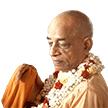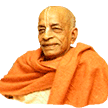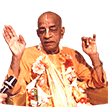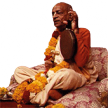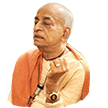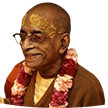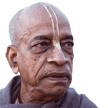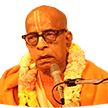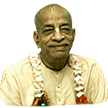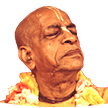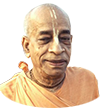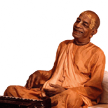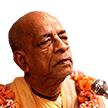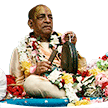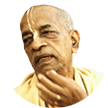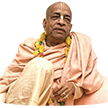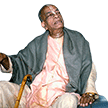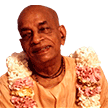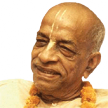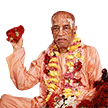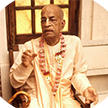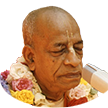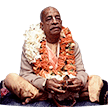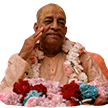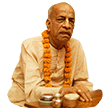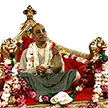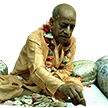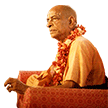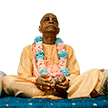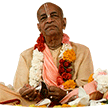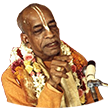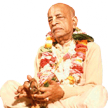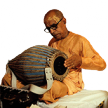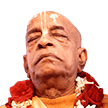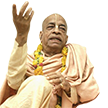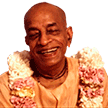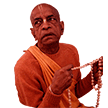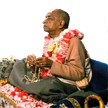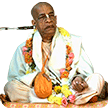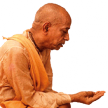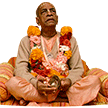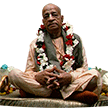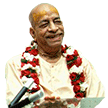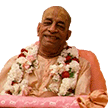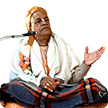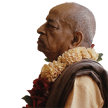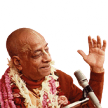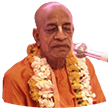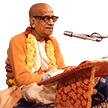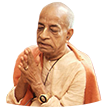A Month in the Life of Srila Prabhupada - October 1975
The Months in the Life of Srila Prabhupada present 2200+ of his lectures; 905+ of his conversations; 490+ of his morning walks;
65+ of his interviews and 6,570+ of his letters. This listing covers all available material,
- and includes:
- 10,300+ links to Vanisource - our repository of all of Srila Prabhupada's words;
- 470+ short audio clips Nectar Drops from Srila Prabhupada sprinkled throughout the months;
- 1,080 short video clips extracted from lectures, conversations, morning walks or interviews with subtitles in up to 93 languages sprinkled throughout the months;
- 13,350+ concise statements, drawn from Srila Prabhupada's lectures, conversations and letters are highlighted within quoteboxes;
- For further study on the different subjects addressed, each statement links to the various categories in our thematic section of Vanipedia named Vaniquotes;
These statements from the Months in the Life of Srila Prabhupada offer unparalleled insights into his devotional character; his vision to re-spiritualize human society; his dedication to translate, publish & distribute his books; his expertise to tirelessly lead & manage his worldwide movement; his empowered ability to encourage, care for, train & clearly communicate the disciplines he expects from all his disciples as he engages them in their pursuit of Krsna consciousness & performance of missionary activities. Through all these situations one can also experience how Srila Prahhupada consistently represents the pure teachings of Lord Caitanya Mahaprabhu and His associates.
- See also: A Day in the Life of Srila Prabhupada
- See also: the Timeline of Srila Prabhupada's Life - October 1975
Oct 1 to 5 - Mauritius
1975 - October 01
| Nectar Drops from Srila Prabhupada |
| "Prakṛti, material nature, puts us under certain condition, and we work accordingly, not independently. And the prakṛti, material nature, also working under somebody. Just like when you go on the street you see red light and green light. As soon as you see red light you stop your car. So this red light and green light is being manipulated by the police, and the police is working under government. Similarly, this whole material nature is acting like red light or green light, but behind that red light and green light there is the supreme brain. That is the Supreme Personality of Godhead. So as a layman or as child cannot understand how the red light and blue light..., green light is working... He sees simply, he thinks automatically it is being done. That is foolishness. It is not being automatically done. There is machine. There is manipulator behind this red light, this is intelligence." |
| 751001 - Lecture BG 02.11 - Mauritius |
 1975 - October 02
1975 - October 02
| Nectar Drops from Srila Prabhupada |
| Cyavana: They've made so much propaganda that life is meant to enjoy. Everywhere... Prabhupāda: Enjoy, but where is your enjoyment? Come to the practical point. Where is your enjoyment? You are simply suffering. That is their rascaldom. They are suffering; still they say, 'I am enjoying'. This is called illusion, māyā. Enjoy. That we also say, that we are trying to take you to a certain place, kingdom of God or back... Where you will enjoy. Enjoy... Ānandamayo 'bhyāsāt (Vedānta-sūtra 1.1.12). That enjoy is our aim. But where is your enjoyment here? That is your rascaldom. There is no enjoyment; still you say, 'We shall enjoy.'. Cyavana: Their propaganda leads people to think that they can enjoy, that it's possible here. Prabhupāda: They're misleading. That is misleading. We have to check that. That is our Kṛṣṇa consciousness..., that... They are not enjoying, and these rascals misleading them that they are enjoying." |
| 751002 - Morning Walk - Mauritius |
 1975 - October 03
1975 - October 03
| Nectar Drops from Srila Prabhupada |
| Prabhupāda: Sugarcane... One who is suffering in jaundice will taste sugarcane as bitter. That is the taste. So that is the medicine. So he has to take the sugarcane. And by taking, when he is cured he will find, 'Oh, it is very sweet'. Puṣṭa Kṛṣṇa: So then he has to recognize that there is some problem living in this material world. Prabhupāda: No. He does not find any happiness on account of his too much materialistic mind. Brahmānanda: That is the disease. Prabhupāda: That is the disease. So it has to be cured by this bhakti-yoga. So in the bhakti-yoga, in the beginning, it will taste bitter. Therefore they do not come. But if they take to bhakti-yoga, then the material disease will be cured and they will find it is very sweet. Puṣṭa Kṛṣṇa: Yes. |
| 751003 - Morning Walk - Mauritius |
 1975 - October 04
1975 - October 04
| Nectar Drops from Srila Prabhupada |
| "So Kṛṣṇa says, dehino 'smin yathā dehe kaumāraṁ yauvanaṁ jarā, tathā dehāntara-prāptiḥ (BG 2.13). Dehāntara-prāptiḥ is there, information. So how can we deny that there is no life after death? There is. But nobody is caring to understand, "What is my next life? What is going to happen? Today I may be in a very big position, and tomorrow, if I am going to be a tree..." Here we are sitting very comfortably in this room. Just a few years after, there is a tree. He cannot move an inch even, and he has to stand there in cyclone, in scorching heat, in everything. Why? We are... Both of us, we are living entities. Why he has got this body, I have got this body, and one may have better body than me? Why there are so many, 8,400,000 species of life, and different position? Why this is? There is no such inquiry. There is no such knowledge. Therefore they have been described here as andhā, blind." |
| 751004 - Lecture SB 07.05.31 - Mauritius |
 1975 - October 05
1975 - October 05
| Nectar Drops from Srila Prabhupada |
| "Religion is disturbed by duṣkṛtina, demons, and those who are saintly person, they execute religion. So paritrāṇāya sādhūnām. Sādhu means saintly person, devotee of God. They are sādhu. And asādhu, or demon, means persons who deny the authority of God. They are called demons. So two business—paritrāṇāya sādhūnāṁ vināśāya ca duskrtam: 'To curtail the activities of the demons and to give protection to the saintly person, I descend'. Dharma-saṁsthā...: 'And to establish dharma, the principles of religion'. These are the three business for which Kṛṣṇa, or God, or God's representative—or, you say, God's son—they come. This is going on." |
| 751005 - Lecture SB 01.02.06 - Mauritius |
Oct 6 to 13 - Durban
 1975 - October 06
1975 - October 06
| Nectar Drops from Srila Prabhupada |
| Prabhupāda: Dog is thinking, 'I am free,' running here and there. As soon as the master, 'Come on...' (laughter) Just see. Dog has no sense, 'I was jumping like free, but I am not free'. That sense he hasn't got. So if a human being has not so such sense, then what is the difference between him and the dog? Hmm? This is to be considered. But they have no sense, no brain, no education, and they are still going on as civilized. Just see. Mūḍha. Therefore mūḍho nābhijānāti (BG 7.25). Puṣṭa Kṛṣṇa: They think that this is the most civilized that human beings have ever been, this modern so-called civilization. Prabhupāda: Civilization... If you remain in a dog's position, is that civilization? Puṣṭa Kṛṣṇa: No. |
| 751006 - Morning Walk - Durban |
 1975 - October 07
1975 - October 07
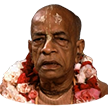 vanipedia.org |
I am in due receipt of your letter dated August 6 and enclosed daksina and I thank you very much. |
 1975 - October 08
1975 - October 08
| Nectar Drops from Srila Prabhupada |
| Prabhupāda: A human being must be responsible, that 'I have got this opportunity to get out of this cycle of birth and death and different forms of life, and let me properly understand God and what is my relationship with God and act accordingly, so that if we understand what is God, then we go back to home, back to Godhead'. Bill Faill: What can an ordinary man do? I mean the Kṛṣṇa consciousness movement involves shaving the head and wearing the saffron robe. What can the man who is caught up in family life do? Prabhupāda: This saffron robe is not very essential, or cut the hair, but it creates some good situation, mental. You see? Just like a military man, when he is dressed properly he gets some energy to feel like a military man. But it does not mean that unless you are dressed, you cannot fight. It does not mean. So God consciousness can be revived in any condition, without any check. But these conditions are helpful. |
| 751008 - Interview - Durban |
 1975 - October 09
1975 - October 09
 1975 - October 10
1975 - October 10
| Nectar Drops from Srila Prabhupada |
| Prabhupāda: I remember, I was a boy and was jumping. And now I cannot do that, because I have got a different body. So I am conscious that I possessed a body like that. Now I do not possess. So the body is changing, but I am, the person, eternal. Very simple example. One requires little brain only, that I, the owner of the body, is eternal. The body is changing. Prof. Olivier: Hmm. Yeah, but now having accepted that, a further problem then arises: what are the implications? Prabhupāda: Yes, that, if we understand that I am not body. So at the present moment I am engaged only to keep my body in comfort. But I am not taking any care of myself. Just like I am cleansing the shirt and coat, thrice daily, uh, but I am hungry. No food for me, only washing material for my shirt and coat. And this basic civilization is wrong. |
| 751010 - Conversation - Durban |
 1975 - October 11
1975 - October 11
| Nectar Drops from Srila Prabhupada |
"So this human form of life is very durlabha, very rarely got. Durlabhaṁ mānuṣaṁ janma.
This is the version of Prahlāda Mahārāja. He was preaching Kṛṣṇa consciousness among his school friends. Because he was born in a demon father's family, Hiraṇyakaśipu, he was stopped uttering even 'Kṛṣṇa'. He could not get any opportunity in the palace, so when he was coming to school, at the tiffin hour he would call his small friends, five years old, and he would preach this Bhāgavata-dharma. And the friends would say, 'My dear Prahlāda, we are now children. Oh, what is the use of this Bhāgavata-dharma? Let us play'. Now he said, 'no'. Kaumāra ācaret prājño dharmān bhāgavatān iha, durlabhaṁ mānuṣaṁ janma (SB 7.6.1): 'My dear friends, don't say that we'll keep it aside for cultivating Kṛṣṇa consciousness in old age. No, no'. Durlabham. 'We do not know when we shall die. Before the next death we must complete this Kṛṣṇa consciousness education'. That is the aim of human life. Otherwise we are losing the opportunity. |
| 751011 - Lecture BG 18.45 - Durban |
 1975 - October 12
1975 - October 12
 1975 - October 13
1975 - October 13
| Nectar Drops from Srila Prabhupada |
| "The weak is the food for the strong. This is the law of nature, that one living entity is the food for another living entity. So when a person eats another living entity, it is not unnatural. This is nature's law. But when you come to the human form of living entity, you must use your discrimination. Just like one living entity is food for the another living entity, it does not mean... In the lower animals sometimes the father-mother eat the offspring, but in the history of human society it has not come into notice that the father-mother eating the offspring. But time has come when the mother is killing offspring. That has come already. This is due to Kali-yuga." |
| 751013 - Lecture BG 13.01-3 - Durban |
Oct 14 to 23 - Johannesburg
 1975 - October 14
1975 - October 14
| Nectar Drops from Srila Prabhupada |
"At the time of my death again, as I remember my circumstances,
The subtle body mind, intelligence and ego that does not annihilate. The gross body earth, water, air, fire that is finished. Then the subtle body carries me to another gross body. Just like the flavor; the air carries the flavor. If it is blowing on some nice rose garden, the air carries the flavor of the rose. Similarly, my activities in this life will be, at the time of death, will be carried by the subtle body to form another gross body. So that gross body may be any one of the 8,400,000's. There are 8,400,000 forms of body. And by the laws of nature, I will have to enter in one of them. Therefore you will find varieties of living entities. So bhakti-yoga means to get relief from this business of being entangled in different bodies. That is called bhakti-yoga." |
| 751014 - Lecture - Johannesburg |
 1975 - October 15
1975 - October 15
| Nectar Drops from Srila Prabhupada |
| "You should understand that as soon as you get this material body, it will be suffering only. Therefore whole Vedic civilization is a culture how to stop this material body. The Māyāvādī philosophers, they are also trying. The Buddhists, they are also trying. But they are thinking that 'There is no soul. Finish this body' This is Buddhist theory. But they know that this is suffering. Similarly, the Māyāvādī, they also know this body is suffering, so they want to come out of the body and merge into the existence of God. The senses are already there, either Buddhist or Māyāvāda. And Vaiṣṇava philosophy is, 'Not only come out of this miserable condition of life, but enter into Kṛṣṇa's family and live peacefully'. But so far the body is bad, it is accepted by all philosophies." |
| 751015 - Conversation - Johannesburg |
 1975 - October 16
1975 - October 16
| Nectar Drops from Srila Prabhupada |
| Prabhupāda: You want to live securely, but that is not there. You may make political arrangement very secure, but what is the nature's arrangement? You'll be kicked out at any moment. There is no certainty. There is no guarantee even that you will be allowed to live for so many years. At any moment. Harikeśa: But if we're always thinking of death, how can we enjoy life now? Prabhupāda: But death is sure. If you are not thinking, then you are a rascal. That is the point. (laughs) Death is sure. And if you are not thinking, then you are a rascal. That is the proof. Suppose I am sitting here, we are walking here, and some danger is coming. It will immediately kill. So shall I remain here very peacefully? (laughter) First of all make insurance, just like they make insurance, that no death will come. Your scientific advancement, your so many advancement, make it sure that you will not die; you will live here comfortably forever. Then you make your house nice, decorate it very... Where is that arrangement? |
| 751016 - Morning Walk - Johannesburg |
 vanipedia.org |
In India we have got so many centres. Which ever is convenient for you, you can join and live with us. |
 1975 - October 17
1975 - October 17
 1975 - October 18
1975 - October 18
| Nectar Drops from Srila Prabhupada |
| "Once you have committed sinful activities, killing the child in the womb, 'All right, stop it now'. 'No, again.' Tṛpyanti neha kṛpana (SB 7.9.45). He's never satisfied. He knows that there is suffering behind this. Still, he'll not stop it. Therefore a sober man... A man should be educated to become sober, that 'Let me tolerate this itching, that's all. I save so much trouble'. This is knowledge. To become rascal and more rascal, more rascal and suffer, is that civilization? Simply to make the people rascal and suffer and commit suicide? Just tell them that he has created this civilization that suffer and become rascal. That's all. Unless you become rascal, how you will suffer? So keep them rascal and suffer. This is nature's arrangement, that 'You living entity, you have forgotten Kṛṣṇa. All right, come under my control. Be rascal, remain rascal and suffer'. Daivī hy eṣā guṇamayī mama māyā (BG 7.14). Why she is doing that? "Surrender to Kṛṣṇa. Otherwise you will go on suffering like this." This is the nature's way." |
| 751018 - Morning Walk - Johannesburg |
 1975 - October 19
1975 - October 19
| Nectar Drops from Srila Prabhupada |
| Prabhupāda: Anyone who is not a devotee, he is animal. Śva-viḍ-varāhoṣṭra-kharaiḥ saṁstutaḥ puruṣaḥ paśuḥ (SB 2.3.19). The big animal is being worshiped by a small animal. That's all. A lion in the forest is worshiped by the small animals. So does it mean the lion is not animal? Puṣṭa Kṛṣṇa: He is also animal. Prabhupāda: He is also animal. So similarly, all these leaders, these scientists, these philosophers, they are applauded by the small animals, but they are also animals, big animal, that's all. The test is whether he understands the spirit soul different from the body. If he does not understand, he is animal, that's all. Maybe big animal, that is a different thing. Big or small, animal is animal. Puṣṭa Kṛṣṇa: So anyone who is not aware of the spirit soul... Prabhupāda: He is animal. That's all. Sa eva gokharaḥ. That is the verdict of the śāstra. Yasyātmā buddhiḥ kuṇape tri-dhātuke (SB 10.84.13). |
| 751019 - Morning Walk - Johannesburg |
| Nectar Drops from Srila Prabhupada |
| "Somewhere there is classification: 'Lazy intelligent, busy intelligent, lazy fool and busy fool'. So, at the present moment (laughs) the whole world is full of busy fools. But first-class man, he is lazy intelligent. Lazy and intelligent, that is first-class man. And second-class man, busy intelligent. And third class means lazy fool, and fourth class means busy fool. When the fools are busy... Just like nowadays they are busy, but they are fools. Like monkey, he is very busy. You see? And they prefer to be generation of monkey, busy fool. That's all. Fools, when he is busy, he is simply creating havoc, that's all. Better... Lazy fool is better than him, because he will not create so much harm, but this busy fool will simply create harm. And first-class man is lazy intelligent. He knows the value of life, and soberly he is thinking. Just like all our great saintly persons, they were living in the forest, meditation, tapasya and writing books. All, you will find, lazy intelligent. They are first-class men." |
| 751019 - Morning Walk - Johannesburg |
 1975 - October 20
1975 - October 20
| Nectar Drops from Srila Prabhupada |
| "In the Bhagavad-gītā it is said, janma-mṛtyu-jarā-vyādhi-duḥkha-doṣānudarśanam (BG 13.9). We are trying to be happy, fighting with unhappiness, but we do not know our real unhappiness are that we have to die, we have to take birth again, we have to become diseased and we have to accept old age. Janma-mṛtyu-jarā-vyādhi duḥkha-doṣānudarśanam. This is intelligence, that 'I am trying to solve all the problems of life by advancement of civilization, education, scientific knowledge and so many things'. That's all right. But what is the solution of my these four principle of miserable condition: birth, death, old age and disease? And because we cannot make any solution, we set aside these four problems. We go on with the temporary problems and become busy to solve it, and in this way we waste our this valuable human form of life like the cats and dogs. This is the instruction. So we should not do that." |
| 751020 - Lecture SB 05.05.01 - Johannesburg |
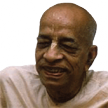 vanipedia.org |
The Upadesamrta can be composed in the Bhagavatam format in the size of the pocket NOD. |
 1975 - October 21
1975 - October 21
 1975 - October 22
1975 - October 22
| Nectar Drops from Srila Prabhupada |
| "When this body is no more useful to continue, then by nature another body is offered. At the time of death, as it is stated in the Bhagavad-gītā, yaṁ yaṁ vāpi smaran loke tyajaty ante kalevaram, sadā tad-bhāva-bhāvitaḥ (BG 8.6)—we create a mental situation. We have got two kinds of bodies: subtle body and gross body. This gross body is made of five gross material elements: earth, water, fire, air, ether, and the subtle body is made of mind, intelligence and ego. When we sleep, the gross body does not work but the subtle body works. We dream therefore. So the... At the time of death this gross body is finished, but the subtle body—mind, intelligence and ego—will carry me to another gross body." |
| 751022 - Lecture SB 05.05.02 - Johannesburg |
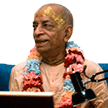 vanipedia.org |
The persons coming to India, however, must be experienced older devotees, not new men. |
- Letter to Ideal Advertising Agency written from Johannesburg
- Letter to Tulsi written from Johannesburg
Oct 24 to 26 - Mauritius
 1975 - October 24
1975 - October 24
 1975 - October 25
1975 - October 25
| Nectar Drops from Srila Prabhupada |
| "Any woman should be looked upon as mother. This is culture. Except his married wife, all women should be treated as mother. The brahmacārīs were taught like that, 'Mother'. This is culture. Simply they are trying to elope other's wife, other's woman, exploit them. And they're cultured. There is no culture at the present moment. Mātṛvat para-dāreṣu para-dravyeṣu loṣṭravat (Cāṇakya-śloka 10): 'And others' money should be treated just like pebbles in the street'. Nobody cares for it. So they are simply making plans how to grab others' money. And ātmavat sarva bhūteṣu: 'And if you feel pains and pleasure, you should consider for others also'. If your throat is cut, then do you feel very happy? Why you are cutting the throats of the poor animals? Where is culture? There is no culture. Simply rogues and thieves and rascals and fools. Where is culture? They do not know what is the meaning of culture." |
| 751025 - Morning Walk - Mauritius |
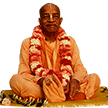 vanipedia.org |
Yes. "Let me die peacefully. Don't bring doctor." I say also. Don't bring doctor when I am diseased. |
- Letter to Hindu Newspaper written from Mauritius
- Letter to The Statesman written from Mauritius
- Letter to The Times of India written from Mauritius
 1975 - October 26
1975 - October 26
Oct 26 to 31 - Nairobi
 1975 - October 26
1975 - October 26
 1975 - October 27
1975 - October 27
 1975 - October 28
1975 - October 28
| Nectar Drops from Srila Prabhupada |
| "Everyone is thinking he is the most exalted personality, scientist, philosopher, great man. That is material disease. Actually he is being kicked every moment by the urges of the senses, and he is thinking he is very great man. Go-dāsa. Go means senses. He is always, cut down by the sense urges, and he is thinking 'independent'. Independent means servant of the senses. This is going on. So you have to understand the real position of the world, and if you want to preach, then you have to... humbler than the tree, humbler than the grass, tolerant than the tree and... We know everyone is rascal; still, you have to give him honor. Then it will be possible to say something. Otherwise it is very difficult." |
| 751028 - Morning Walk - Nairobi |
 1975 - October 29
1975 - October 29
| Nectar Drops from Srila Prabhupada |
| "Life after life, life after life, we are changing body, but forgetting Kṛṣṇa. So here, in the human form of life, there is the opportunity to revive our original position, and we require the help of knowledge, perfect knowledge. And that is there in the Vedas. Ataeva kṛṣṇa veda purāṇa. If we don't take advantage, although we have got... We can read Bhagavad-gītā, and if we don't take advantage of Bhagavad-gītā and go on whimsically, then we'll suffer. You cannot non-cooperate with Kṛṣṇa as you cannot non-cooperate with the stomach. This is the... You must. There is no question of alternative. You may, may not know. It is not... You must. This is the position. Otherwise you'll never be happy. And happiness is your aim of life. Atyantika-duḥkha-nivṛttiḥ." |
| 751029 - Conversation B - Nairobi |
 1975 - October 30
1975 - October 30
| Nectar Drops from Srila Prabhupada |
| "The original form, Kṛṣṇa, when He was present, the original form so many people have seen. They have got photograph..., not photograph; paintings. And it is confirmed in the śāstras, in the Brahma-saṁhitā, veṇuṁ kvaṇantam aravinda-dalāyatākṣaṁ barhāvataṁsam asitāmbuda-sundarāṅgam (Bs. 5.30). Kṛṣṇa is described in the Brahma-saṁhitā, from so millions and millions of years ago described by Lord Brahma, that veṇuṁ kvaṇantam aravinda-dalāyatākṣaṁ. He is always playing His flute, veṇuṁ. Venu means flute. Kvaṇantam. And eyes are like the petals of lotus flower. Veṇum kvaṇantam aravinda-dalāyatākṣaṁ barhāvataṁsam. And on the head He has got the plume of peacock feather. In this way the description is there in the śāstra." |
| 751030 - Lecture SB 03.28.20 - Nairobi |
 1975 - October 31
1975 - October 31
